As prime minister, the Right Honorable Sir Winston Leonard Spencer Churchill successfully led Britain through World War II. He described the achievement as his "walk with destiny" — a destiny for which he believed he had spent all his life in preparation. He was one of the great statesmen of world history. Often satirized as a bulldog, Churchill’s far-sightedness, toughness, tenacity, courage and will to win despite the odds, enlisted support at home and abroad.
Winston Churchill was an accomplished speaker, author, painter, soldier and war reporter. The mere sight of him, with the characteristic Cuban cigar in his mouth and two fingers raised in the “V for victory” sign, encouraged the population. He was John Bull, a British mythical character and the symbol of the common people, come to life. With a powerful command of the English language, he wrote histories and biographies. At 78, he won the Nobel Prize for Literature. Churchill served his country from 1895 to 1964.
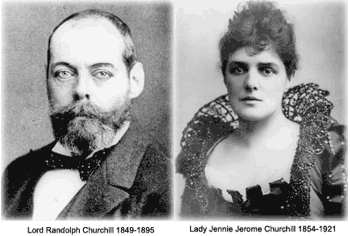 Churchill`s youth and education
Winston was born the son of an eminent Tory politician, at Blenheim Palace in Oxfordshire, England, on November 30, 1874. His father, Lord Randolph Churchill (1849-1895), was a leader in the Conservative party, and his mother was Lady Jennie Jerome Churchill (1854-1921), an American heiress. Mrs. Churchill was beautiful and charming. Winston was the elder of his brother, John, by six years. Winston adored his mother, but as a busy wife and hostess, she had little time for him. He regarded his father with fear and awe. Winston was high-spirited and had a stubborn streak, which annoyed everyone. His childhood was unhappy, he was chubby and did poorly in school; he talked with a lisp and stuttered. His father, a brilliant scholar, found him to be a disappointment, and also had little time for him.
Churchill`s youth and education
Winston was born the son of an eminent Tory politician, at Blenheim Palace in Oxfordshire, England, on November 30, 1874. His father, Lord Randolph Churchill (1849-1895), was a leader in the Conservative party, and his mother was Lady Jennie Jerome Churchill (1854-1921), an American heiress. Mrs. Churchill was beautiful and charming. Winston was the elder of his brother, John, by six years. Winston adored his mother, but as a busy wife and hostess, she had little time for him. He regarded his father with fear and awe. Winston was high-spirited and had a stubborn streak, which annoyed everyone. His childhood was unhappy, he was chubby and did poorly in school; he talked with a lisp and stuttered. His father, a brilliant scholar, found him to be a disappointment, and also had little time for him.
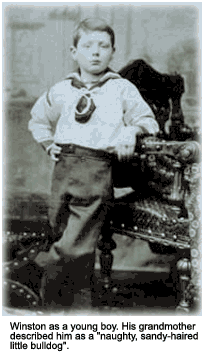 At age 12, Winston entered Harrow school, a private secondary boarding school. He was the lowest boy in the lowest class. However, Winston began to blossom at Harrow. He discovered a love of literature and writing, which he would enjoy all the days of his life. Winston’s father, observing him at play with his toy soldier army, impatiently judged his son to be of limited intelligence. Thus, he decided his boy was suited only for a military career. Winston, after failing the entrance exam twice, entered the Royal Military Academy at Sandhurst. He soon led his class in tactics and fortifications. Winston graduated eighth in his class, and consequently was appointed a second lieutenant in the Fourth Queen`s Own Hussars cavalry regiment just a month after his father`s death.
Early political career
By age 21, Churchill wanted to see some action. When posted to a quiet spot, however, he developed skill at polo and found time to study many of the books he had neglected at school. He favored the works of Edward Gibbon and Thomas Macaulay. On several occasions, Churchill, through his family’s influence, managed to take leave of his army post for military operations field reporting. On one occasion, in northwestern India, fighting had broken out between the British and Indian tribesmen. He was able to take leave from his regiment and transfer to the area as a paid reporter for two newspapers. He was caught in the bloody hand-to-hand fighting, but returned unscathed. His first book, a novel, was The Story of the Malakand Field Force (1898). After another similar adventure came another book, The River War (1899).
At age 12, Winston entered Harrow school, a private secondary boarding school. He was the lowest boy in the lowest class. However, Winston began to blossom at Harrow. He discovered a love of literature and writing, which he would enjoy all the days of his life. Winston’s father, observing him at play with his toy soldier army, impatiently judged his son to be of limited intelligence. Thus, he decided his boy was suited only for a military career. Winston, after failing the entrance exam twice, entered the Royal Military Academy at Sandhurst. He soon led his class in tactics and fortifications. Winston graduated eighth in his class, and consequently was appointed a second lieutenant in the Fourth Queen`s Own Hussars cavalry regiment just a month after his father`s death.
Early political career
By age 21, Churchill wanted to see some action. When posted to a quiet spot, however, he developed skill at polo and found time to study many of the books he had neglected at school. He favored the works of Edward Gibbon and Thomas Macaulay. On several occasions, Churchill, through his family’s influence, managed to take leave of his army post for military operations field reporting. On one occasion, in northwestern India, fighting had broken out between the British and Indian tribesmen. He was able to take leave from his regiment and transfer to the area as a paid reporter for two newspapers. He was caught in the bloody hand-to-hand fighting, but returned unscathed. His first book, a novel, was The Story of the Malakand Field Force (1898). After another similar adventure came another book, The River War (1899).
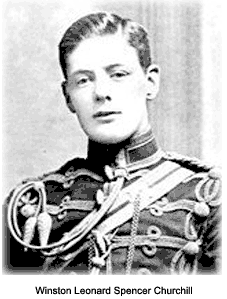 While writing his second book, Churchill resigned from the army in 1899. In 1900, he ran for a seat in Parliament on the Conservative ticket, but lost. Later that year he was hired by a London newspaper to report on the Boer War in South Africa. While in transit in South Africa, his train was attacked and he was taken prisoner. He escaped from prison, eluded capture and became a national hero. Upon his return to England that same year, at the age of 21, he was received as a hero by Oldham, the community that had rejected his first political foray. He ran and was elected to Parliament on the Conservative Party ticket. In 1904, Churchill crossed the floor to the Liberals, changing parties over the issue of Tariff Reform. Moving through several increasingly important government jobs, he first entered the Cabinet as president of the board of trade, then home secretary by 1910.
Churchill family life
Churchill met Clementine Hozier in the spring of 1908 and married her on September 12, 1908. Churchill wrote, “My most brilliant achievement was my ability to persuade my wife to marry me.” The happy couple became parents of one boy and three girls. One of the girls, Marigold, died at age three. During war years, Churchill`s marriage was to be the source of his inner strength, his life raft in stormy seas. Other sources of satisfaction included writing newspaper articles, and later in life, he wrote several books and painted landscapes quite successfully.
While writing his second book, Churchill resigned from the army in 1899. In 1900, he ran for a seat in Parliament on the Conservative ticket, but lost. Later that year he was hired by a London newspaper to report on the Boer War in South Africa. While in transit in South Africa, his train was attacked and he was taken prisoner. He escaped from prison, eluded capture and became a national hero. Upon his return to England that same year, at the age of 21, he was received as a hero by Oldham, the community that had rejected his first political foray. He ran and was elected to Parliament on the Conservative Party ticket. In 1904, Churchill crossed the floor to the Liberals, changing parties over the issue of Tariff Reform. Moving through several increasingly important government jobs, he first entered the Cabinet as president of the board of trade, then home secretary by 1910.
Churchill family life
Churchill met Clementine Hozier in the spring of 1908 and married her on September 12, 1908. Churchill wrote, “My most brilliant achievement was my ability to persuade my wife to marry me.” The happy couple became parents of one boy and three girls. One of the girls, Marigold, died at age three. During war years, Churchill`s marriage was to be the source of his inner strength, his life raft in stormy seas. Other sources of satisfaction included writing newspaper articles, and later in life, he wrote several books and painted landscapes quite successfully.
World War I
In 1911, Prime Minister Herbert H. Asquith appointed Churchill First Lord of the Admiralty. The P.M. wanted a strong leader of the navy who understood that the imminent danger of German aggression could bring war to England. After the Outbreak of the War in Europe, Britain entered the conflict in 1914, and the navy was ready. Churchill had reorganized and modernized the navy, and developed anti-submarine tactics.
Churchill’s attack on the Dardanelles and the Gallipoli Peninsula failed miserably. Considering himself to be a failure, he resigned from the admiralty. In July 1915, he joined the British army in France as a major, then as lt. colonel in charge of a battalion. In 1917, the new prime minister, David Lloyd George, appointed Churchill to the post of Minister of Munitions. Having previously promoted development of the battlefield tank, Churchill now organized full-scale production. The year 1918 brought appointment to the position of secretary of state for war, (1918–21), then as colonial secretary (1921–22), he helped negotiate the treaty that set up the Irish Free State.
Having switched from Conservative to Liberal in 1904, Churchill returned to the Conservative party 20 years later. After two defeats at the polls he returned to the House of Commons as a Conservative, and became chancellor of the exchequer (a position Churchill’s father had held 40 years earlier) in Stanley Baldwin`s Conservative government from 1924 to 1929. As an advocate of laissez-faire economics, he was strongly criticized by John Maynard Keynes. Churchill was not a financial innovator; he basically followed conventional advice from his colleagues. Nevertheless, his decision to return the country to the prewar gold standard increased unemployment and was a cause of the general strike of 1926. He advocated aggressive action to end the strike, thus earning the lasting distrust of the labor movement.
War interrupted
World War I ended in 1918 in an exhausted armistice with the signing of the Treaty of Versailles. The treaty, reviled by the Germans, was eventually to be disregarded by Adolf Hitler when he secretly began to rearm and rebuild the German Army in 1933. Churchill left Parliament in 1929 after a Conservative Party election loss, not to return to a cabinet position until 1939. Parenting, painting and writing filled Churchill’s time between 1929 and 1939. He kept well informed during the 1930s, writing and speaking out against the German threat, only to be labeled a warmonger. The gathering clouds of war over Europe were not generally perceived. Churchill had an uphill battle in Parliament, attempting to provide illumination on Adolf Hitler’s activities and intentions.
World War II
Germany attacked Poland on September 1, 1939. England and France declared war on Germany on September 3. World War II was under way. As soon as the war began, Prime Minister Neville Chamberlain reappointed Churchill to First Lord of the Admiralty, the same position he had filled during World War I. The Chamberlain government failed eight months later. On May 10, 1940, King George VI asked Churchill to form a new government. That same day, Germany invaded Belgium, Luxembourg, and the Netherlands.
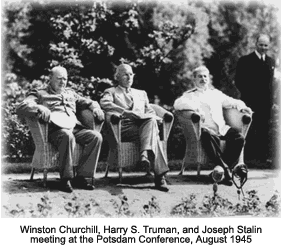 Churchill became Prime Minister of Great Britain at age 66. Later he wrote about that time, “I felt as if I were walking with destiny, and that all my past life had been in preparation for this hour and this trial." Winston Churchill, Adolf Hitler and Josef Stalin held one thing in common: Each believed his destiny lay in great service to his country.
Churchill was endowed with prodigious inner strength, depth of thought and far-sighted wisdom. He also loved his wife deeply and gained much of his inner strength from his marriage, his writing and painting. In an address to the House of Commons on June 4, 1940, Churchill averred that even though all of Europe might fall ... “we shall not flag or fail. We shall go on to the end ... we shall fight in the seas and oceans ... we shall fight on the beaches, we shall fight on the landing grounds, we shall fight in the fields and in the streets, we shall fight in the hills, we shall never surrender...” Churchill’s greatest strength was the will to maintain Britain as a great power and a great democracy.
Battle of Britain
A day after France’s surrender to Germany on June 22, 1940, Churchill addressed the House of Commons, declaring: “Let us therefore brace ourselves to our duties, and so bear ourselves that, if the British Empire and its Commonwealth last for a thousand years, men will say, ‘This was their finest hour.’” During August to October 1940, an air war was waged in the skies over England. Preparing for an invasion of England, Germany attacked British coastal defenses, radar stations, and shipping. On August 24 the attacks began to include Royal Air Force installations and aircraft factories, in an effort to gain control of the skies over southern England.
Failing to destroy the RAF, the Germans began the night bombing, or Blitz, of London. Heavy night bombings of English cities continued into October, when the attacks reverted to coastal installations. The Germans gradually gave up hope of invading England. Though heavily outnumbered, the RAF put up a gallant defense. Radar, used for the first time in battle and played an important role.
Churchill became Prime Minister of Great Britain at age 66. Later he wrote about that time, “I felt as if I were walking with destiny, and that all my past life had been in preparation for this hour and this trial." Winston Churchill, Adolf Hitler and Josef Stalin held one thing in common: Each believed his destiny lay in great service to his country.
Churchill was endowed with prodigious inner strength, depth of thought and far-sighted wisdom. He also loved his wife deeply and gained much of his inner strength from his marriage, his writing and painting. In an address to the House of Commons on June 4, 1940, Churchill averred that even though all of Europe might fall ... “we shall not flag or fail. We shall go on to the end ... we shall fight in the seas and oceans ... we shall fight on the beaches, we shall fight on the landing grounds, we shall fight in the fields and in the streets, we shall fight in the hills, we shall never surrender...” Churchill’s greatest strength was the will to maintain Britain as a great power and a great democracy.
Battle of Britain
A day after France’s surrender to Germany on June 22, 1940, Churchill addressed the House of Commons, declaring: “Let us therefore brace ourselves to our duties, and so bear ourselves that, if the British Empire and its Commonwealth last for a thousand years, men will say, ‘This was their finest hour.’” During August to October 1940, an air war was waged in the skies over England. Preparing for an invasion of England, Germany attacked British coastal defenses, radar stations, and shipping. On August 24 the attacks began to include Royal Air Force installations and aircraft factories, in an effort to gain control of the skies over southern England.
Failing to destroy the RAF, the Germans began the night bombing, or Blitz, of London. Heavy night bombings of English cities continued into October, when the attacks reverted to coastal installations. The Germans gradually gave up hope of invading England. Though heavily outnumbered, the RAF put up a gallant defense. Radar, used for the first time in battle and played an important role.
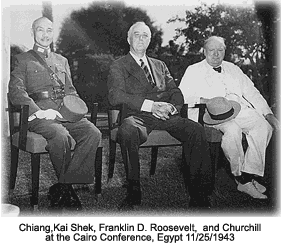 Strategic meetings with FDR
During the war, Churchill promised nothing more than "blood, toil, tears and sweat." He mobilized and inspired courage in an entire nation. Throughout the war he worked tirelessly, and built good relations with President Roosevelt while at the same time maintaining an alliance with Josef Stalin and the Soviet Union. FDR spelled out Anglo-American war goals in concert with Winston Churchill (August 1941) in the Atlantic Charter. The charter rejected territorial aspirations, promoted autonomous government and progressive international trade agreements. It also vowed permanent security against aggression and freedom from privation.
Churchill had mastered military tactics and fortifications early on, complementing FDR`s skills. Churchill and Roosevelt exchanged more than 1700 messages and met nine times before FDR`s death in 1945.
Strategic meetings with FDR
During the war, Churchill promised nothing more than "blood, toil, tears and sweat." He mobilized and inspired courage in an entire nation. Throughout the war he worked tirelessly, and built good relations with President Roosevelt while at the same time maintaining an alliance with Josef Stalin and the Soviet Union. FDR spelled out Anglo-American war goals in concert with Winston Churchill (August 1941) in the Atlantic Charter. The charter rejected territorial aspirations, promoted autonomous government and progressive international trade agreements. It also vowed permanent security against aggression and freedom from privation.
Churchill had mastered military tactics and fortifications early on, complementing FDR`s skills. Churchill and Roosevelt exchanged more than 1700 messages and met nine times before FDR`s death in 1945.
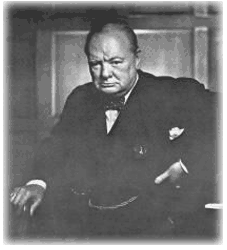 A final stint as prime minister came at the age of 77, and Churchill continued to contribute into even older age. He was rewarded with a string of decorations, including an honorary U.S. citizenship and accolades listing him among the greatest living Englishmen.
Sir Winston Churchill died at the age of 90 with his wife and other family members at his bedside. His remains lay in state in Westminster Hall for three days — an honour not accorded any English statesman since Gladstone in 1898. The funeral followed at St Paul`s cathedral.
The link below accesses a lecture given by Margaret Thatcher, British Prime Minister at Fulton, Missouri in 1996. Where Churchill delivered his famous 1946 Iron Curtain speech.
A final stint as prime minister came at the age of 77, and Churchill continued to contribute into even older age. He was rewarded with a string of decorations, including an honorary U.S. citizenship and accolades listing him among the greatest living Englishmen.
Sir Winston Churchill died at the age of 90 with his wife and other family members at his bedside. His remains lay in state in Westminster Hall for three days — an honour not accorded any English statesman since Gladstone in 1898. The funeral followed at St Paul`s cathedral.
The link below accesses a lecture given by Margaret Thatcher, British Prime Minister at Fulton, Missouri in 1996. Where Churchill delivered his famous 1946 Iron Curtain speech.Works by Churchill: